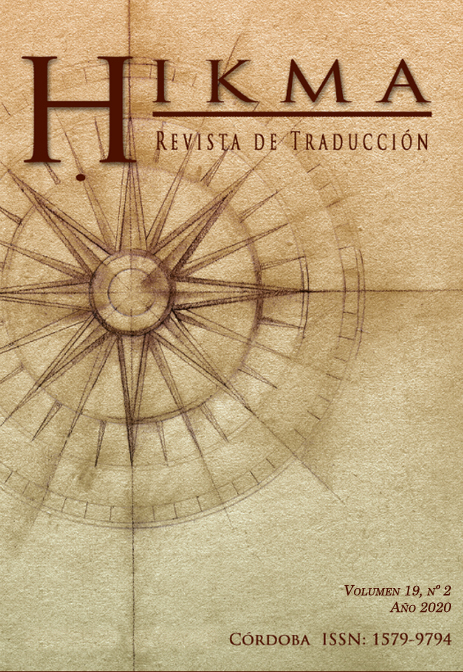Hacia un nuevo estímulo lingüístico-pragmático acerca de la traducción de fenómenos humorísticos
Contenido principal del artículo
Resumen
Resumen:
Este artículo es el fruto de varios años de investigación en torno al concepto de humor y (in)traducibilidad. Partiendo de numerosas investigaciones sobre el humor y su traducción (Attardo y Raskin, 1991; Attardo, 1994, 2002; Hickey, 1998, n.d. ; Fuentes, 2000 o Santana, 2006), en este artículo se pretende presentar un nuevo enfoque lingüístico-pragmático sobre los fenónemos humorísticos basado en el concepto de impulso perlocutivo, así como desarrollar un marco teórico-práctico que permita a los traductores fomentar su capacidad creativa y conseguir el nivel máximo de naturalidad en el texto traducido. Entendiendo el encargo de traducción como un elemento pro-activo en el marco de una tendencia funcionalista basada en el concepto de «recreación», en este artículo se presenta un enfoque teórico-práctico basado en el concepto de estímulo ICRETRA. Tras revisar el concepto básico de «competencia traductora», en estas líneas se aboga por la adición de una sub-competencia creativa al modelo tradicional de sub-competencias. Con esta revisión de conceptos tradicionales y una aplicación teórico-práctica concreta se pretende evitar el excesivo apego que los traductores en ciernes presentan al TO cuando se trata de la traducción de textos especializados. El humor, por tanto, demuestra ser el mejor vehículo para fomentar la naturalidad y creatividad de los traductores, independientemente del tipo de texto con el que se trabaje.
Palabras clave: funcionalismo recreativo, sub-competencia creativa, encargo de traducción pro-activo, estímulo ICRETRA
Abstract:
This article is the result of a long-lasting research on the concept of humour and its (un)translatability. On the basis of a large number of previous research studies conducted into humour and translation (Raskin and Attardo, 1991; Attardo 1994, 2002; Hickey, 1998, n.d.; Fuentes, 2000 or Santana, 2006), this article aims to put forward a new linguistic and pragmatic approach to humourous phenomena based on the concept of perlocutionary impulse, as well as to present a theoretical and practical framework that allows translators to improve their creative competence and to produce the most natural translations possible. By considering translation assignments as pro-active elements in the framework of a functionalist approach to the concept of recreation, we present a theoretical and practical analysis constructed on the concept of ICRETRA stimulus. Thus, after reviewing the basic notion of translation competence, we support the addition of a creative sub-competence to the traditional scheme of translation sub-competences. With all this in mind, we aim to avoid the sometimes excessive subjugation of trainee translators to the source text when translating specialized texts. Humour is therefore regarded as the best vehicle to increase naturalness and creativity of translators, regardless of the text typology they deal with.
Key-words: recreative functionalism, creative sub-competence, pro-active translation assignment, ICRETRA stimulus
Descargas
Detalles del artículo

Esta obra está bajo una licencia internacional Creative Commons Atribución-NoComercial-CompartirIgual 4.0.
Los/as autores/as que publican en esta revista aceptan las siguientes condiciones:
- Los/as autores/as conservan los derechos de autor y conceden a la revista el derecho de primera publicación con el trabajo simultáneamente bajo una Licencia de Atribución Creative Commons que permite a otros compartir el trabajo con un reconocimiento de la autoría del trabajo y la publicación inicial en esta revista.
- Los/as autores/as pueden llegar a acuerdos contractuales adicionales por separado para la distribución no exclusiva de la versión publicada del trabajo en la revista (por ejemplo, enviarlo a un repositorio institucional o publicarlo en un libro), con un reconocimiento de su publicación inicial en esta revista.
- Se permite y anima a los/as autores/as a publicar sus trabajos en línea (por ejemplo, en repositorios institucionales o en su sitio web) antes y durante el proceso de presentación, ya que puede dar lugar a intercambios productivos, así como a una citación más temprana y mayor del trabajo publicado (Véase El efecto del acceso abierto).

